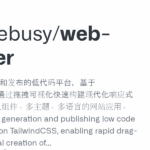ai testing agent
Basic Information
This repository provides an AI Testing Agent that uses a Large Language Model via OpenRouter to automate API testing tasks. The agent is designed to generate a human-readable test plan for an API, produce pytest-compatible Python test code based on that plan, run the generated tests, and accept natural-language feedback to refine or extend the test suite. It assumes a REST-style API by default but allows customization through prompts so users can describe their actual endpoints, parameters, and expected responses. The toolchain includes a simple example FastAPI app for local testing and a LangChain-based chatbot interface for interactive commands. Environment variables control the LLM API key and an optional target API base URL, and the project is released under an open-source license.








